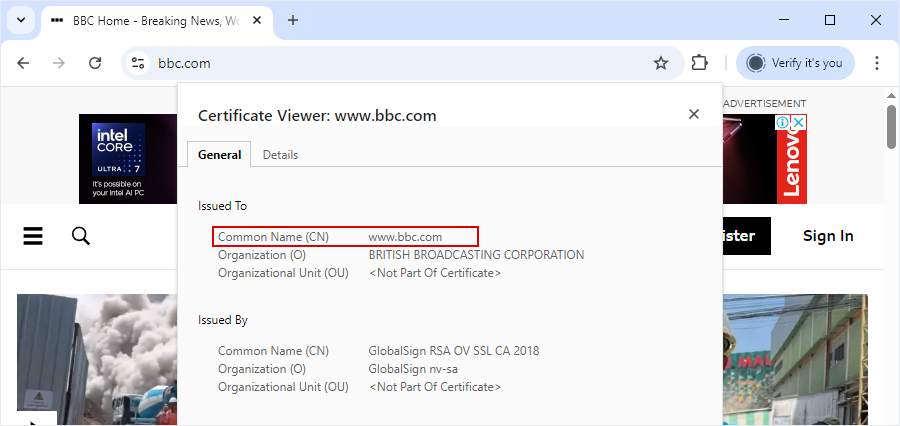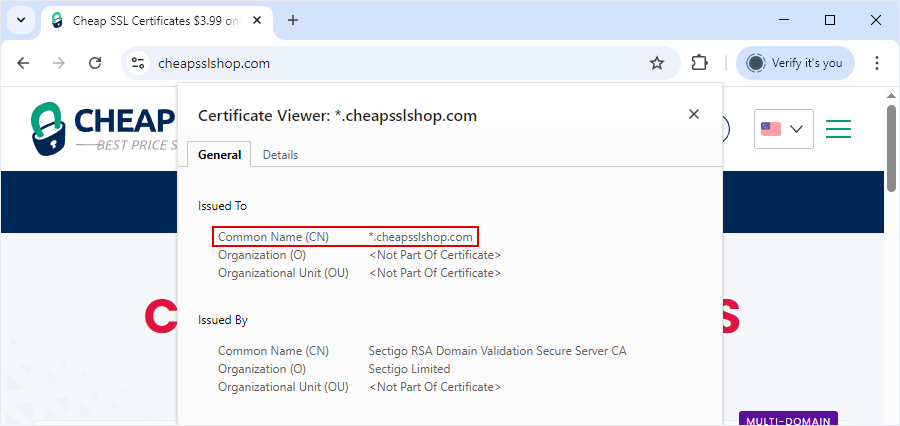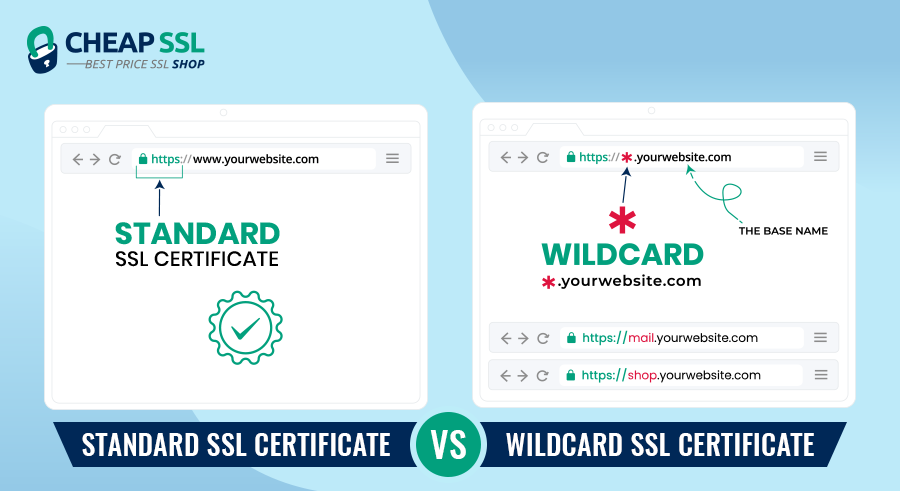Securing your domain is a priority – whether you run a personal website, a business site, an e-commerce store, or even a government portal. So the real question isn’t if you need SSL, but which one is right for your business?
Website owners handling a single domain may find a Standard SSL certificate sufficient, while developers and businesses managing multiple subdomains may need the flexibility of a Wildcard SSL certificate. While both encrypt data and offer 100% browser & major platform compatibility, they differ in coverage, functionality, and cost-effectiveness.
In this article, we’ll break down the differences, their benefits, and best-fit scenarios for Standard SSL vs. Wildcard SSL certificates. We’ll also cover the key security aspects that set them apart, so you can make the smartest choice without overpaying or overcomplicating your setup. Let’s dive in!
What Standard SSL Certificate Offers
A Standard SSL certificate, also called a single domain SSL certificate, is specifically designed for securing one FQDN (Fully Qualified Domain Name). For instance, if you buy a basic SSL for www.cheapsslshop.com, it’ll only secure that domain. These SSLs are ideal for a static website, informative website, blogging platform, and more.

Additionally, some commonly seen benefits are:
- Affordable compared to Wildcard certificates.
- Available in all three validation levels: DV (Domain Validation), OV (Organization Validation), and EV (Extended Validation).
- Easy to install & manage.
- Recommended for websites with a single domain & no sub-domains.
What Wildcard SSL Certificate Offers
A Wildcard SSL certificate is for securing one primary domain & unlimited first-level subdomains using a wildcard character (*) within the domain name field. For example, a wildcard-secured SSL for *.cheapsslshop.com, will secure www.cheapsslshop.com, blog.cheapsslshop.com, mail.cheapsslshop.com, and any other subdomain you may create in the future before the expiration.

Further, benefits offered by Wildcard-secured SSL certificate include:
- Secures primary domain & sub-domains using a single certificate.
- Suitable for growing websites planning to add subdomains in the future.
- Prevents the need to buy and manage individual SSL certificates for every subdomain.
- Reduces administrative tasks as you can manage all subdomains using a single certificate.
- Long-term SSL solution, as it secures any new subdomain you create.
Standard SSL vs. Wildcard SSL – What’s Common Between the Two?
Though standard and wildcard SSL certificates differ in many ways, they share some common things, and they’re as under:
- They offer strong encryption strength SHA 256-bits & SSL protocol TLS 1.2 or TLS 1.3.
- Globally respected certificate authorities like DigiCert, Comodo, Sectigo have the right to issue Standard as well as Wildcard SSL certificates.
- Both come with a maximum of 1 year validity period (according to the rules of CA/B Forum) and need regular renewal once it expires.
- Both offer issuance in domain validation and organization validation.
- Both are compatible with various web servers like NGINX 1.26.3, Cloudflare, and Apache.
- More than 99% compatibility with all the modern browsers and devices.
Standard SSL vs. Wildcard SSL: Features Differentiated
Domain Coverage
- Basic SSL certificate secures one domain like www.cheapsslshop.com or an individual subdomain like mail.cheapsslshop.com.
- Wildcard SSL certificate has a wildcard character (*), which is added within the CN (Common Name) field at the time of CSR generation. It helps secure a primary domain and all first-level subdomains. For instance, *.cheapsslshop.com and first-level subdomains like mail.cheapsslshop.com, login.cheapsslshop.com, shop.cheapsslshop.com.
Validation
- Regular SSL certificate is issued in all three validation levels: DV (Domain Validation), OV (Organization Validation) and EV (Extended Validation).
- A Wildcard is issued at two validation levels: DV (Domain Validation) and OV (Organization Validation), while EV (Extended Validation) is not available. EV requires a higher level of validation and verification process. In addition, subdomains are represented by an asterisk and cannot be explicitly listed.
Usage & Management
- A unique private key is generated by the standard SSL certificate for every domain or subdomain. It needs individual management if there are multiple domains.
- Wildcard makes use of a single private key for securing the primary domain and unlimited first-level subdomains, while simplifying SSL management.
SSL Renewal
- Basic SSL certificate needs an individual renewal for every domain or subdomain.
- Renewal of a single Wildcard certificate is required to continue SSL security for all subdomains, which also reduces administrative tasks.
Use Cases
- Single Domain SSL certificate is ideal for single-domain websites, blogs, personal sites, micro websites, or web applications that don’t have subdomains.
- Wildcard certificate is best for complex organization sites with multiple subdomains looking for centralized management or SaaS platforms.
Comparison of Standard SSL vs. Wildcard SSL Certificates
Let’s go through the side-by-side comparison for a better understanding:
| Standard SSL Certificate | Wildcard SSL Certificate | |
|---|---|---|
| Coverage | Secures one FQDN or individual subdomain. | Secures one primary domain & unlimited subdomains. |
| Cost | Affordable as compared to Wildcard SSLs | Higher than basic SSL, but cost-effective for a website with multiple subdomains. |
| Requirement | Needs to buy separate SSL for every domain or subdomain. | Single wildcard certificate can secure all subdomains. |
| Validation Level | Issued in all three Domain Validation, Organization Validation & Extended Validation. | Issued only in Domain Validation & Organization Validation. |
| Applications | Best for websites with no subdomains. | It is ideal for sites having multiple subdomains or with future scope of scalability. |
How to Choose the Right SSL Certificate for Your Website?
Getting a standard or a Wildcard certificate depends upon structure, future scalability, and budget, especially if you’re looking for an SSL certificate for subdomains. Issued in both the options by leading CAs (Certificate Authorities) like ClickSSL, Comodo, and RapidSSL, it guarantees compatibility & rigorous SSL security. Here, below are some important points, which will help you decide which one to choose.
Go for a Standard SSL Certificate if:
- Your website has one domain or subdomain.
- The budget is tight and looking for an affordable SSL solution.
- Do not have any plans of adding subdomains.
- Looking for SSL security quickly without any advanced SSL features.
Go for a Wildcard SSL Certificate if:
- The website includes multiple subdomains, or in the future, you’re planning to add subdomains.
- Looking for simplified SSL certificate management.
- Need a cost-effective SSL solution for securing multiple subdomains.
- Don’t have any need for a top-level SSL security provided by an EV (Extended Validated) SSL certificate.
Basic/Standard SSL Certificate from Top Certificate Authorities for 2025
| Standard/Single-Domain SSL | Validation Level | Warranty | Lowest Price |
|---|---|---|---|
| ClickSSL Standard SSL | Domain Validation (DV) | $10,000 | $3.99/yr. |
| RapidSSL DV certificate | Domain Validation (DV) | $10,000 | $10.00/yr. |
| EssentialSSL OV Certificate | Organization Validation (OV) | $250,000 | $25.00/yr. |
| PositiveSSL EV Certificate | Extended validation (EV) | $1,750,000 | $50.00/yr. |
Affordable Wildcard SSL Certificates from Top SSL Brands for 2025
| Wildcard SSL | Validation Level | Warranty | Lowest Price |
|---|---|---|---|
| ClickSSL Wildcard SSL | Domain Validation (DV) | $10,000 | $29.00/yr. |
| PositiveSSL Wildcard Certificate | Domain Validation (DV) | $10,000 | $49.00/yr. |
| EssentialSSL OV Wildcard Certificate | Organization Validation (OV) | $250,000 | $90.00/yr. |
| RapidSSL Wildcard Certificate | Domain Validation (DV) | $10,000 | $70.00/yr. |
Conclusion
Both Standard & Wildcard certificate plays an important role in website security and building site visitor trust and confidence. Standard certificate is best suited for small websites having a single domain, and a Wildcard provides scalability and a cost-effective SSL solution for websites having multiple subdomains. This blog helps you understand which option you should look for according to your website’s structure, & future planning.
Secure your website’s online presence with CheapSSLShop’s wide range of low-cost SSL certificates with fastest issuance. If you’re not sure, you can consult our SSL experts through live chat, who will help you decide which option you should go for.


